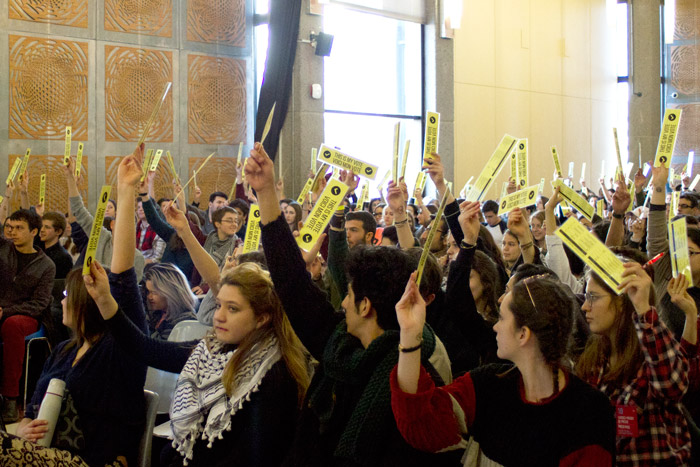The passage of the Boycott, Divestment and Sanctions (BDS) motion at the Students’ Society of McGill University (SSMU) Winter 2016 General Assembly (GA), and its subsequent failure in an online ratification period, has garnered a variety of reactions among the McGill community—including the administration’s condemnation of the university’s participation in the BDS movement.
The motion, brought forward by petition and initially passed at the GA, proposed a mandate for SSMU to support campaigns associated with the BDS movement through the office of the vice-president (VP) External, and specifically outlined a need to divest from corporations the supporters of the movement considered complicit in the occupation of the Palestinian territories.
McGill Principal Suzanne Fortier released a statement following the release of the online ratification results, explaining the university’s position on the BDS movement.
“The BDS movement, which among other things, calls for universities to cut ties with Israeli universities, flies in the face of the tolerance and respect we cherish as values fundamental to a university,” Fortier wrote. “It proposes actions that are contrary to the principles of academic freedom, equity, inclusiveness and the exchange of views and ideas in responsible, open discourse.”
Laura Khoury, U2 Engineering, an organizer of McGill BDS Action Network—the group responsible for bringing the motion forward—expressed dismay with Fortier’s letter.
“It was extremely disappointing to see Principal Fortier, through her statement, delegitimize the voices of more than 2,000 students without attempting to understand their concerns,” Khoury wrote in an email to the Tribune.
The motion specifically referenced McGill’s investments in companies operating in Israeli settlements, including Mizrahi-Tefahot Bank and Re/Max real estate. Principal Fortier’s statement did not address those investments, focusing rather on the implications of divesting from Israeli universities.
“It is frustrating that the statement did not address the actual text of the motion,” Khoury wrote. “The lack of acknowledgement of these existing financial ties to international corporations that clearly demonstrate social injury toward Palestinians on a daily basis is an active stance to be complicit in the illegal Israeli occupation.”
According to McGill’s Internal Relations Director Doug Sweet, it is impossible to ignore the fact that boycotts from academic institutions are a central part of the BDS movement as a whole.
“Principal Fortier’s statement was consistent with the university’s position on the BDS movement in its entirety, which includes an academic boycott of Israeli academics and scholars, and their institutions,” Sweet wrote in an email to the Tribune. “[The] McGill administration has been on the record as being steadfastly opposed to this movement [….] You cannot isolate just one component of the movement and seek support for it that way.”
Khoury cited financial pressures as the suspected primary reason for the university’s steadfast opposition to BDS.
“It is important to realize that the reaction by the University has clearly come from outside financial pressure and is not based on principled research,” Khoury wrote.
Sweet alluded to the divisive effect that the motion has had on the McGill community, and on alumni in particular.
“As you can imagine with an issue as divisive as this, and an alumni base as large and widespread as McGill’s, alumni reaction has been quite diverse, as it has been for our Faculty members, students and staff,” Sweet explained. “Some agree with the stance taken by Principal Fortier; some don’t. As it is the case with every issue, we listen to all members of our community and take their concerns – some of which can be polar opposites–to heart.”
One such alumna, Jodie Katz (BA ’97), vehemently disagreed with the university’s participation in the BDS movement.
“I was appalled and shocked by the SSMU verdict [regarding] BDS two weeks ago, and further revolted by the mail—which I received moments after the vote came through my social media feeds—asking me to please donate to the school which I now believe to be tainted and tarnished,” Katz wrote in an email to the Tribune. “Confused by the actions that transpired at the SSMU vote, I am so saddened that my beloved school is now a thorn in my side.”
According to Katz, the motion has the potential to misrepresent the student population as a whole.
“Every student at McGill should be fairly represented,” Katz explained. “The BDS movement reeks of propaganda and unrealistic perspectives [….] As a Jew, we must stand with Israel and we must all become more educated about the treatment of Palestinians by all nations and make proper informed perspectives. Calling something an ‘apartheid state’ with little initiative other than calling on a boycott is irresponsible.”
When asked if the failed online ratification would change her perspective on making donations to McGill, Katz did not dissent.
“I will have to reconsider but right now the answer is no,” Katz wrote. “I am encouraged by McGill’s response and Principal Fortier’s email but it’s ‘already out there’ making us look as bad as the schools who do not denounce.”
According to Khoury, despite the motion’s failure, the McGill BDS Action Network will continue its efforts on campus.
“The McGill BDS Action network will continue to organize around BDS because there is an obvious marginalization of Palestinian students and their allies at McGill,” Khoury wrote. “In moments like these it is important to look at the history of McGill’s institutional positions on social movements.
Khoury justified the continuation of BDS Action by drawing parallels to both Canada’s and McGill’s reactions to the divestment movement around South Africa in the 1980s.
“Both the Canadian government and McGill were complicit in South African apartheid and initially refused to join the international movement to divest,” Khoury wrote. “There is historical proof that people in positions of power have been in the wrong before and are generally pressured by financial powers rather than moral, principled reasoning. It is only until the social pressure from students, faculty, and alumni outweighs McGill’s financial interests that the university will have to change its stance.”
In response, Sweet stated that the university will maintain its position on the BDS movement.
“The university administration’s position on BDS is clear, and has been since this issue was first raised on campus in 2007,” Sweet wrote. “We will reiterate it as necessary.”
In light of the controversy surrounding the BDS motion, during its Feb. 24 Council meeting, SSMU Council passed a motion to put forward a question during the Winter Referendum which, if passed, would create a GA Steering Committee, composed of the SSMU president, VP (University Affairs), speaker of council, four councillors and a third Executive member to be chosen by a vote of the Council, who will decide if the content of a potential GA motion is too divisive or external to SSMU’s mandate to be debated and voted on by students. The question additionally outlines that the GA Steering Committee’s ruling can be overturned by a two-thirds majority.
“The requirement that positions on external political issues be adopted by a two-thirds vote would ensure that the adoption of external positions comes with the support of a significant portion of the Membership,” the motion reads.










Pingback: Obama Administration Anti-Semitism Czar Defines Anti-Zionism As Jew Hatred
Pingback: Campus Roundup: A review of this month’s Israel/Palestine activities on campuses across Canada | Canada Talks Israel-Palestine